August marked a month of strategic validation and industry leadership for Zinier. While previous months showcased major customer wins and partnership announcements, August demonstrated how our platform capabilities and strategic vision are shaping broader industry conversations around emergency preparedness, AI adoption, and operational efficiency.
Mountain Connect: Critical Industry Insights
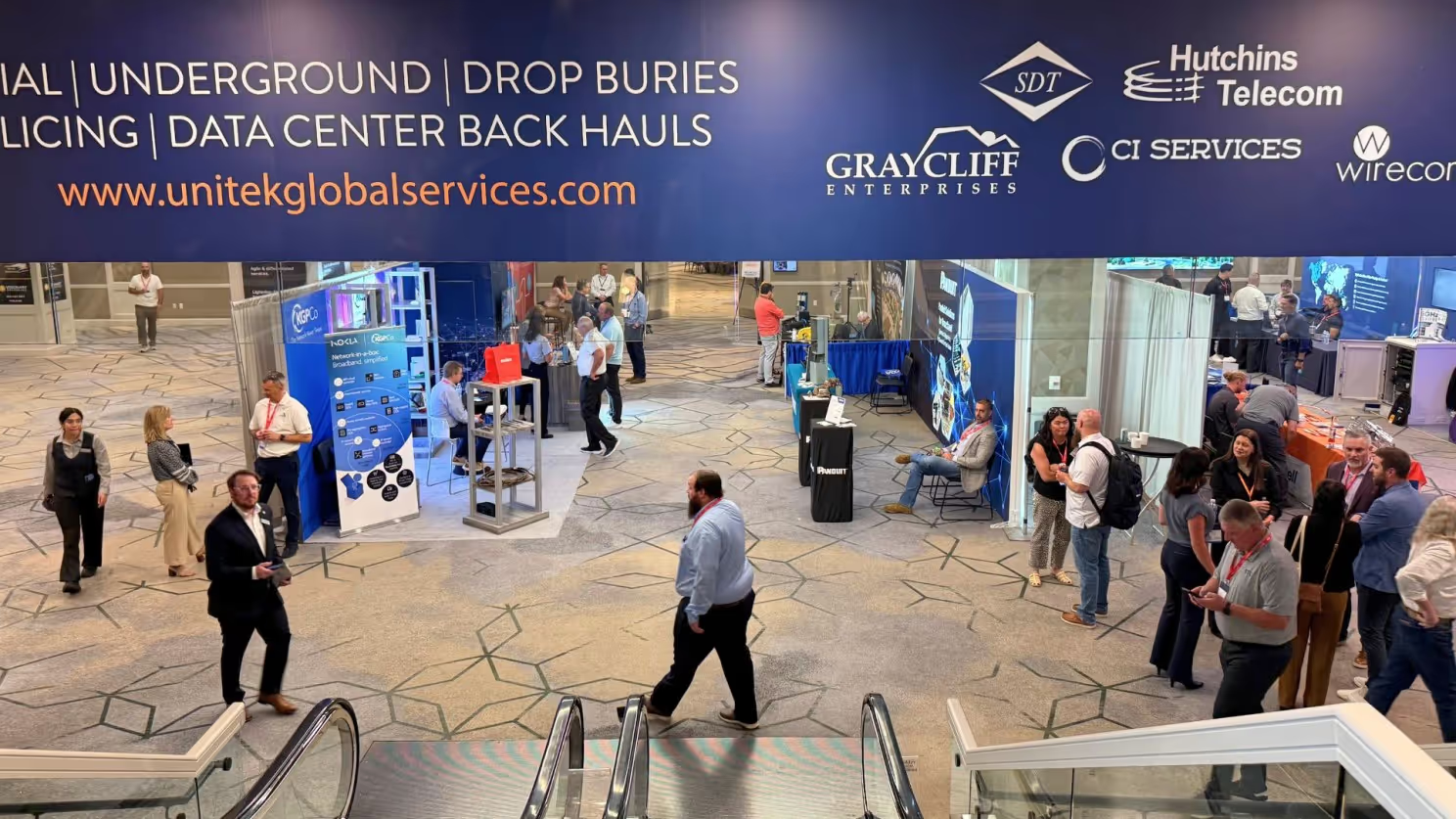
Emergency Preparedness Becomes Strategic Imperative
Our team's participation at Mountain Connect revealed how dramatically the industry conversation around disaster preparedness has evolved. The BERT (Building Emergency Response Team) discussion highlighted that telecommunications operators are building comprehensive playbooks designed to restore service within 72 hours of major disruptions.
Traditional field service management systems struggle to rapidly reconfigure operations during crisis situations. Manual rescheduling, resource reallocation, and emergency prioritization create bottlenecks precisely when speed matters most. The Zinier platform's architecture and Studio Z low-code capabilities enable organizations to rapidly deploy emergency response workflows. Custom configurations that might take months with traditional platforms can be implemented in days, allowing operators to build the disaster response capabilities they need without waiting for vendor development cycles.
AI Adoption Reaches Tipping Point
One of the most significant insights from Mountain Connect was the fundamental shift in AI adoption conversations. The question is no longer whether to implement AI in field operations, it's how quickly organizations can make it work effectively in their specific environments. Field technician AI assistance and intelligent scheduling have moved from "nice-to-have" capabilities to mission-critical requirements. Organizations that haven't begun their AI transformation are finding themselves at a competitive disadvantage. While AI adoption intent is universal, successful deployment remains challenging. Many platforms promise AI capabilities but struggle with the integration complexity and industry-specific customization required for effective field service operations. Built from the ground up for AI integration, our platform enables them natively.
Operational Efficiency: The Universal Priority
Every conversation at Mountain Connect ultimately returned to operational efficiency. With project costs rising and skilled labor remaining constrained, every operator is seeking ways to maximize output from existing resources while maintaining or improving service quality.
Organizations need to:
- Increase technician productivity without compromising safety
- Handle growing service demands with existing workforce capacity
- Maintain high customer satisfaction while controlling operational costs
- Deploy new capabilities quickly without disrupting existing operations
Partnership Validation: IDI Billing Featured in Industry Press
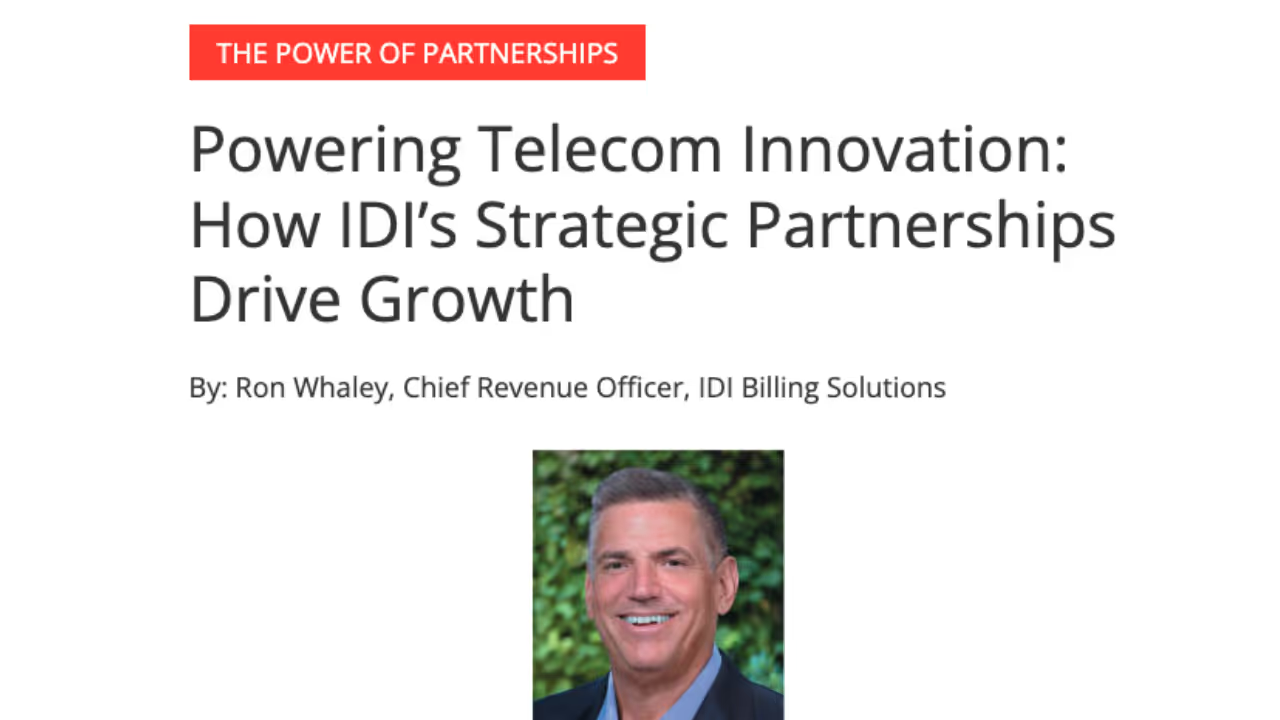
CCA Voice Recognition
July brought significant validation of our strategic partnership approach when IDI Billing Solutions was featured in CCA Voice (Competitive Carriers Association), with specific focus on our collaborative integration and shared customer successes. The article highlighted how strategic technology partnerships are becoming the primary differentiator for carriers who want to move fast without sacrificing operational excellence. The feature showcased IT&E's successful deployment of integrated field service capabilities in months rather than the typical year-plus timeline. IT&E now operates seamlessly across Zinier's field service management platform and IDI's billing and operations platform. As IDI's Ron Whaley noted, these partnerships give smaller carriers access to enterprise-grade capabilities without enterprise complexity—a theme that's becoming increasingly important as market competition intensifies.
🔗 Read the full CCA Voice article
Product Leadership: Scheduling vs. Execution Reality
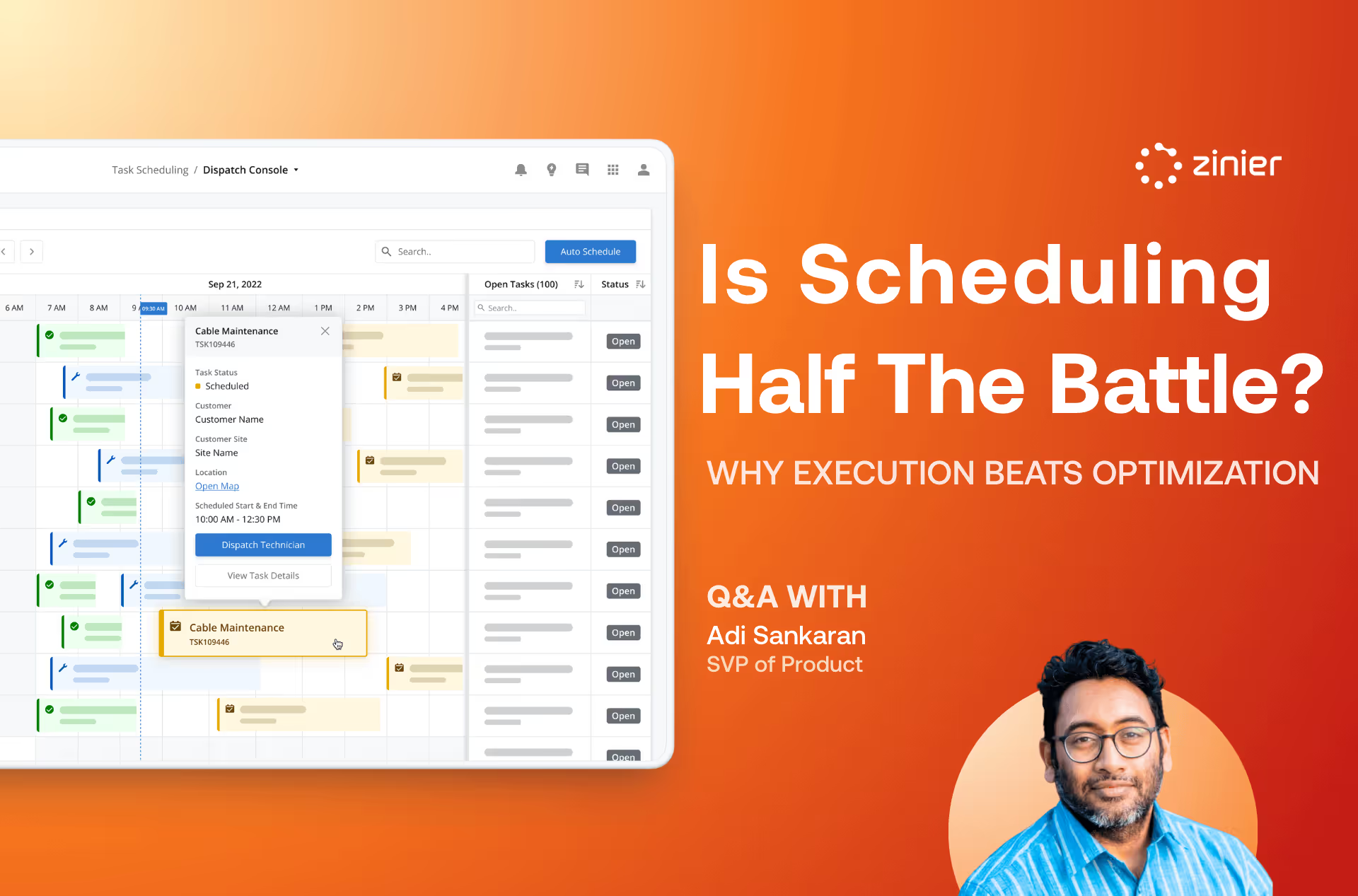
Beyond Perfect Schedules
Zinier's SVP of Product Adi Sankaran provided crucial insight into a common field service challenge that many platforms overlook. The scenario is familiar: technicians receive 6 scheduled jobs daily but complete only 3, with the remaining jobs pushed to the following day.
The Hidden Costs:
- Technician stress and job satisfaction decline
- Back-office productivity metrics become misleading
- Customer experience suffers due to uncertainty
- Resource utilization appears optimized but actual productivity drops
"Your schedule is only as good as your completion rate."
🔗 Read Adi's complete analysis on field service scheduling vs execution
Technology Innovation: Advanced GIS Integration
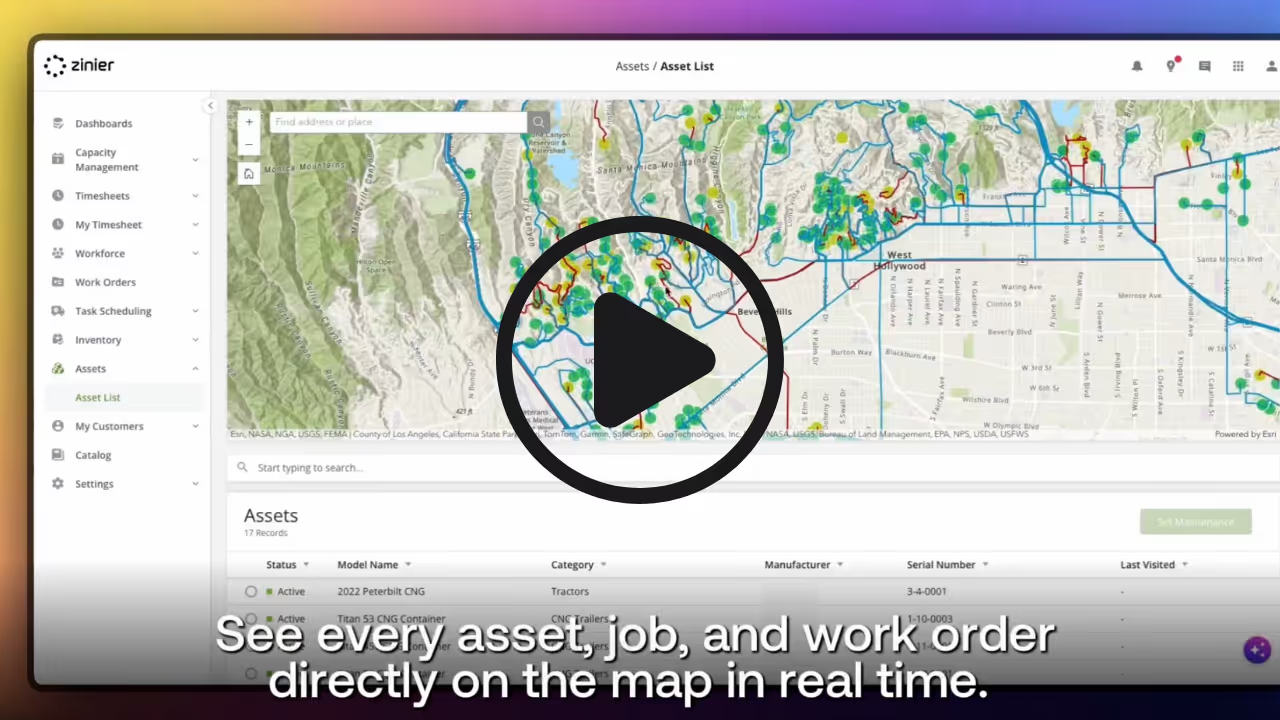
Bringing Live Data to the Field
August showcased our sophisticated GIS integration capabilities with industry-leading providers including Esri, Smallworld, and IQGeo. These integrations enable unified operational views that transform how field teams and back-office operations collaborate.
The integration demonstrates:
- Real-time asset location data integrated with maintenance histories
- Offline mobile access ensuring field teams never lose connectivity
- Bi-directional data synchronization maintaining system accuracy
- Live GIS feeds directly accessible to field technicians
Field technicians gain comprehensive situational awareness while back-office teams maintain complete visibility into field operations, creating unprecedented coordination between field and office operations.
Integration Examples:
- Utility companies viewing asset performance data overlaid on geographic infrastructure maps
- Telecommunications providers tracking fiber deployment progress against geographic rollout plans
- Energy companies monitoring equipment status across distributed generation assets
Watch the full video of Zinier's GIS integration here
Strategic Vision: Service as a Software
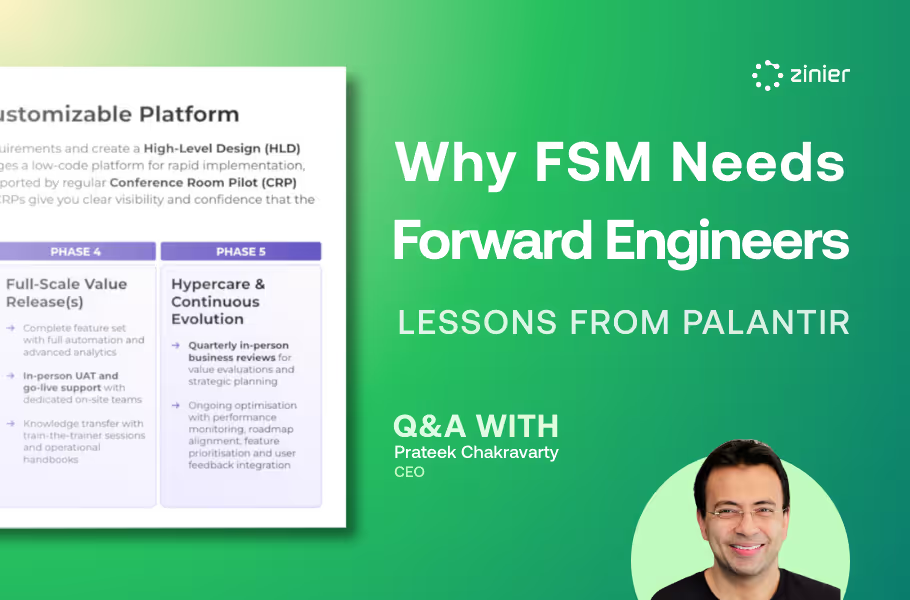
Beyond Traditional SaaS Models
CEO Prateek Chakravarty addressed a fundamental shift occurring in enterprise AI deployment, using examples from companies like OpenAI to illustrate why traditional "sell the product and walk away" SaaS models no longer work for advanced AI implementations.
Enterprise AI deployment requires more than software licensing, it demands embedded domain expertise that understands both technological capabilities and industry-specific operational requirements.
"Service as a Software" combines platform capabilities with ongoing strategic support, ensuring AI implementations deliver sustained value rather than initial deployment followed by underutilization.
As AI capabilities become more sophisticated, successful deployment depends increasingly on strategic implementation rather than technical deployment alone.
🔗 Read the complete deep-dive into why field service needs forward engineers
Industry Positioning: Thought Leadership Impact
Shaping Industry Conversations
August demonstrated how Zinier continues shaping industry conversations around field service transformation. From emergency preparedness strategies to AI adoption methodologies to operational efficiency frameworks, our insights are driving broader industry understanding. Strategic alliances with companies like IDI Billing, Panasonic, Hexagon, and Cyient create comprehensive solutions that address complete operational needs rather than point solutions. Ongoing results from customers like Netline Chile (92% 24-hour installations), Virgin Media O2 (100+ integrations), and IT&E (rapid deployment) continue validating our approach.
Looking Ahead: September and Beyond
August's insights and validations position Zinier for continued leadership as the field service industry navigates its most significant transformation in decades.
Key themes emerging from the month include:
- AI Implementation Urgency: Organizations can no longer delay AI adoption without risking competitive disadvantage, but successful implementation requires strategic approach rather than technology deployment alone.
- Partnership Ecosystem Value: Comprehensive solutions require partnership ecosystems rather than single-vendor approaches, positioning Zinier's collaborative strategy as increasingly valuable.
- Operational Agility Requirements: Market conditions demand platforms that enable rapid adaptation rather than rigid implementations, favoring Zinier's flexible architecture.
- Emergency Preparedness Integration: Disaster response capabilities are becoming essential rather than optional, requiring platforms built for rapid reconfiguration.
Ready to see how Zinier's strategic approach can transform your field operations? Book a demo today.






.svg)

.svg)

.svg)





































%20(2)%20(1).avif)



